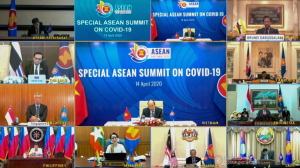The world is facing a global health crisis, with COVID-19 confirmed cases reaching more than 2.1 million as of April 17, with more than 147,000 deaths around the globe. Nearly every country in the world has been affected by the virus and the Southeast Asian region is no exception.
All ASEAN members have reported cases of COVID-19 in their territory; Thailand was the first country in the region with confirmed cases. Up to this point, each state has implemented different regulations and mechanisms to stop the spreading of the virus. In Jakarta, for example, the government has imposed strict limitation for activities in the city — it has the highest number of cases in Indonesia. Meanwhile, Singapore fines individuals not wearing masks in public as a preventive measure.
Despite different policies designed by member states, ASEAN as a regional organization should play a central role in confronting the outbreak. The term “ASEAN centrality ” is frequently used in various narratives related to the group. For instance, the ASEAN Outlook on Indo-Pacific (AOIP) issued last year proposes “ASEAN centrality” as the basis of cooperation within the region.
Regardless of ill-defined terminology, ASEAN centrality is urgently needed during this pandemic.
For the last two months, ASEAN has organized collective actions to contain the spread of the coronavirus, such as a special meeting of ASEAN Coordinating Council on COVID-19, joint statements by ASEAN Foreign Ministers, Economic Ministers, Defence Ministers, Health Ministers, ASEAN Plus Three Health Ministers as well as initiative for cooperation with the United States and European Union. On April 14, the organization conducted an ASEAN Special Summit on COVID-19. These attempts are solid starting points for further collaboration.
ASEAN with should lead cooperation among member states. COVID-19 is a threat that crosses borders, it’s unlikely that a country can stand alone against the threat. At the beginning, the disease was identified in Wuhan, China, but now it has infected more than 2 million of people across the world in just few months. This indicates that the virus is easily transported from one place to another. An “imported case” of COVID-19, which means that an individual got the virus elsewhere and returned to their home country with it, is commonly reported. In Bali, Indonesia, a popular destination for tourists, imported cases have dominated reports.
Southeast Asian countries are geographically close, thus the movement of people — and its potential to spread the virus — should be a top concern for governments. Despite current travel restrictions in several countries, information regarding citizens crossing national borders is still crucial. Governments also need to be well-informed on the development of the COVID-19 crisis across the region and particular in neighboring countries.
Exchanging data on government regulations in response to the outbreak is much needed. In regard to this matter, ASEAN has been playing a central role, particularly ASEAN BioDiaspora Virtual Center (ABVC) which compiles the latest statistics and regulations during pandemic in Southeast Asia. The report is available on the ASEAN website and accessible to the public.
ASEAN members also could learn from each other’s domestic measures. Globally, there have been several success stories of how other countries have slowed the spread of COVID-19 and reduced mortality rates. South Korea, Taiwan, Hong Kong and Singapore have all received international appreciation for their methods of handling the virus. As part of ASEAN, Singapore is a valuable resource for the rest of the grouping.
Supporting Multilateralism
Collaboration among ASEAN countries, along with their external partners, is a bright side of international cooperation under a regional organization. This mechanism promotes multilateral discourse at the global level and ASEAN could be a role model. For the last few years, multilateralism has been threatened. Disbelief in the value of international organizations and global norms is increasing ,with many countries acting against this type of state interaction. Some argue that the election of Donald Trump in the United States and Brexit in the UK are real signs of diminishing multilateralism. This trend is likely to alter the current international order, which relies on multilateral institutions, such as the United Nations and the World Trade Organization.
Nevertheless, ASEAN could counter this narrative through its close connectivity, especially during this global health crisis. Effort to work together facing COVID-19 symbolizes the power of multilateralism where member states are willing to join forces for achieving common goals. Despite multiple domestic problems caused by the spread of the coronavirus, ASEAN countries still put much hope on regional partnership. Their cross-sectoral collaboration initiatives indicate that they strongly believe on collective action to address the COVID-19 issue. This strategy supports the view of multilateralism as solution for global problems. Therefore, the centrality of ASEAN really matters and is urgently needed.
Rifki Dermawan is a lecturer in international relations at Andalas University, Indonesia. He obtained his master’s degree in international relations at Bristol University, the United Kingdom. His research interests are in the area of ASEAN studies and non-traditional security issues.

































